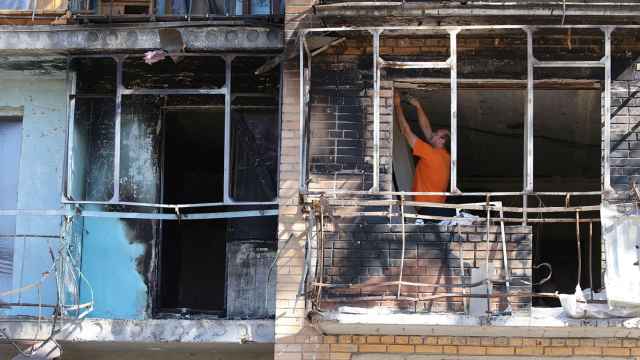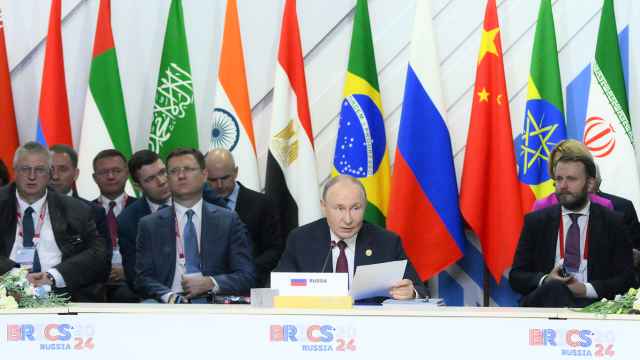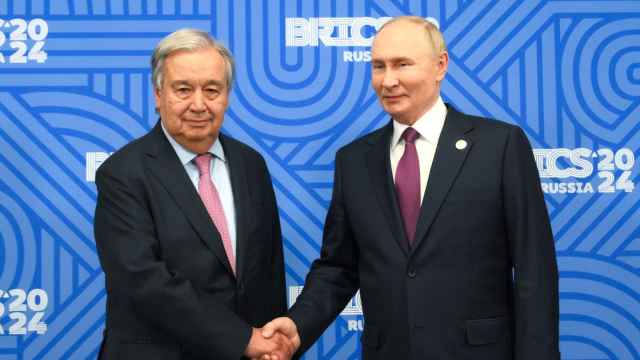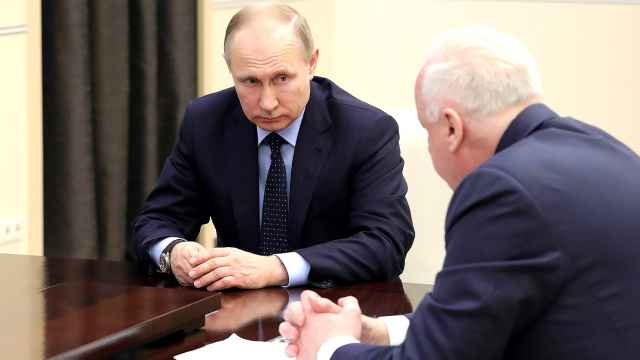After marathon meetings with U.S. Secretary of State John Kerry last week, Foreign Minister Sergei Lavrov hinted that Moscow may finally pressure Syrian President Bashar Assad to leave office.
"We are not interested in the fate of certain individuals," Lavrov said at a late night news conference last Tuesday. "We are interested in the fate of the totality of the Syrian people."
Lavrov and Kerry announced that they would host an international conference where Syrian government officials and rebels will be given a chance to name an interim government. The odds of the two sides agreeing are low, but Kerry deserves credit for securing a small diplomatic step forward here.
The problem is that Lavrov and his boss, President Vladimir Putin, may be unable to deliver on Assad. For nearly two years, Lavrov and Putin have served as the Syrian leaders' chief international ally. But Russian analysts say Washington is kidding itself it if believes Putin can orchestrate a quick and easy end to the conflict in Syria.
"All of this is wishful thinking," said Sergei Strokan, a columnist for Kommersant. "Moscow has quite limited influence on the Syrian regime."
Decades from now, President Barack Obama's decision to not arm Syria's rebels may be condemned or praised by historians. But a visit to Moscow last week showed that it has come at an immediate price. Washington's failure to act created a vacuum that Putin and Lavrov used to boost Russia's global standing.
"For the last two years, Lavrov has dramatically elevated his profile on the world stage," Susan Glasser recently wrote in Foreign Affairs. "He has done so by almost single-handedly defying Western attempts to force some united action to stop Syria's deadly civil war."
Twenty-four hours after Kerry left Moscow, press reports emerged that Russia was planning to sell advanced surface-to-air missile systems to Syria that would make any American attempt to intervene in Syria vastly more difficult.
The Wall Street Journal reported that Israeli officials had warned the Obama administration about the Russia's imminent sale of sophisticated S-300 missiles with a range of 200 kilometers to Syria. Asked about the sale, Kerry said Washington would prefer that Russia not provide arms to Syria and S-300 missiles would be "destabilizing" to Israel. If true, the missile sale would be a personal affront to Kerry, who had enthusiastically praised Putin and Lavrov in Moscow.
Lavrov and Putin have also used Syria to boost their standing at home. Kerry's visit coincided with the one-year anniversary of Putin's disputed re-election to a third term in office. The day after he met with Kerry, Putin signed the dismissal papers of Deputy Prime Minister Vladislav Surkov, who was the architect of the system that has allowed Putin to take control of major industries, seize most media outlets and intimidate or co-opt the country's elite.
With the price of oil low, Putin's oil-dependent economy is flagging. Barring a surge in oil prices, massive social welfare payments are unsustainable. Corruption is endemic, consuming an estimated $300 billion a year, 16 percent of Russia's gross domestic product. Transparency International, an anti-corruption group, currently names Russia the worst nation on earth in its Bribe Payer's index, which ranks firms on their likelihood to bribe.
Putin has tightly controlled who is investigated for bribery and used corruption charges to smear his enemies. The latest in a string of Orwellian examples is the trial of blogger Alexei Navalny, an anti-graft blogger facing dubious embezzlement charges.
A spate of recent laws on libel, protests, blasphemy and treason has made it more difficult to exercise basic rights, The Washington Post reported last month. Putin also recently ordered prosecutors nationwide to search for NGOs that have failed to abide by a new law that requires them to register as "foreign agents" if they receive foreign funding.
Putin is probably secure until the end of his term in 2016, but a slowing economy and public fatigue with Putin are taking a toll. Unpredictable laws and a lack of reliable information have made it increasingly difficult for Western and Russian businesses to operate in the country. In the end, the key factor may be the price of oil, the pillar of Putin's one-dimensional economy.
"If the price of oil drops below $50 [a barrel], it is a death sentence," said a Russian analyst who asked not to be identified.
On the international stage, meanwhile, Russia is ascendant. For Putin, Kerry's request for help marked the achievement of a decade-old goal. From NATO's 1999 bombing of Kosovo, to the 2003 invasion of Iraq, to the 2011 UN-backed toppling of Moammar Gadhafi, Moscow has been largely irrelevant.
By protecting Assad, Putin has forced those in search of peace in Syria to come to Moscow, according to Maria Lipman, a scholar-in-residence at the Carnegie Moscow Center and a leading political analyst. Putin's logic is simple.
"You may denounce us," she explained, "but when it comes to the most important international issue today, you come to Moscow."
So, with all this, why is the Obama administration turning to Putin for help? The answer is simple: The White House's desperate desire not to get its own hands dirty in Syria.
Blame for the death toll in Syria is widespread. Assad, of course, is the worst culprit. His refusal to relinquish power in the face of an initially peaceful protest movement has led to the death of an estimated 70,000 people. In Washington, Obama allowed exaggerated fears of another Iraq to paralyze his administration. Putin, though, has arguably been the most cynical. He exaggerated his influence with Assad to boost his own international standing.
The proposed conference should be carried out. Both sides may miraculously agree on an interim government.
But it is more likely that the U.S. has lost control of the rebels, particularly the jihadists. And Russia has lost control of Assad, who has killed so many people that he now cannot compromise.
Syria's downward spiral will sadly continue.
David Rohde, a two-time winner of the Pulitzer Prize, is the author of "Beyond War: Reimagining American Influence in a New Middle East" and a columnist for Reuters, which published this comment.
Related articles:
A Message from The Moscow Times:
Dear readers,
We are facing unprecedented challenges. Russia's Prosecutor General's Office has designated The Moscow Times as an "undesirable" organization, criminalizing our work and putting our staff at risk of prosecution. This follows our earlier unjust labeling as a "foreign agent."
These actions are direct attempts to silence independent journalism in Russia. The authorities claim our work "discredits the decisions of the Russian leadership." We see things differently: we strive to provide accurate, unbiased reporting on Russia.
We, the journalists of The Moscow Times, refuse to be silenced. But to continue our work, we need your help.
Your support, no matter how small, makes a world of difference. If you can, please support us monthly starting from just $2. It's quick to set up, and every contribution makes a significant impact.
By supporting The Moscow Times, you're defending open, independent journalism in the face of repression. Thank you for standing with us.
Remind me later.






